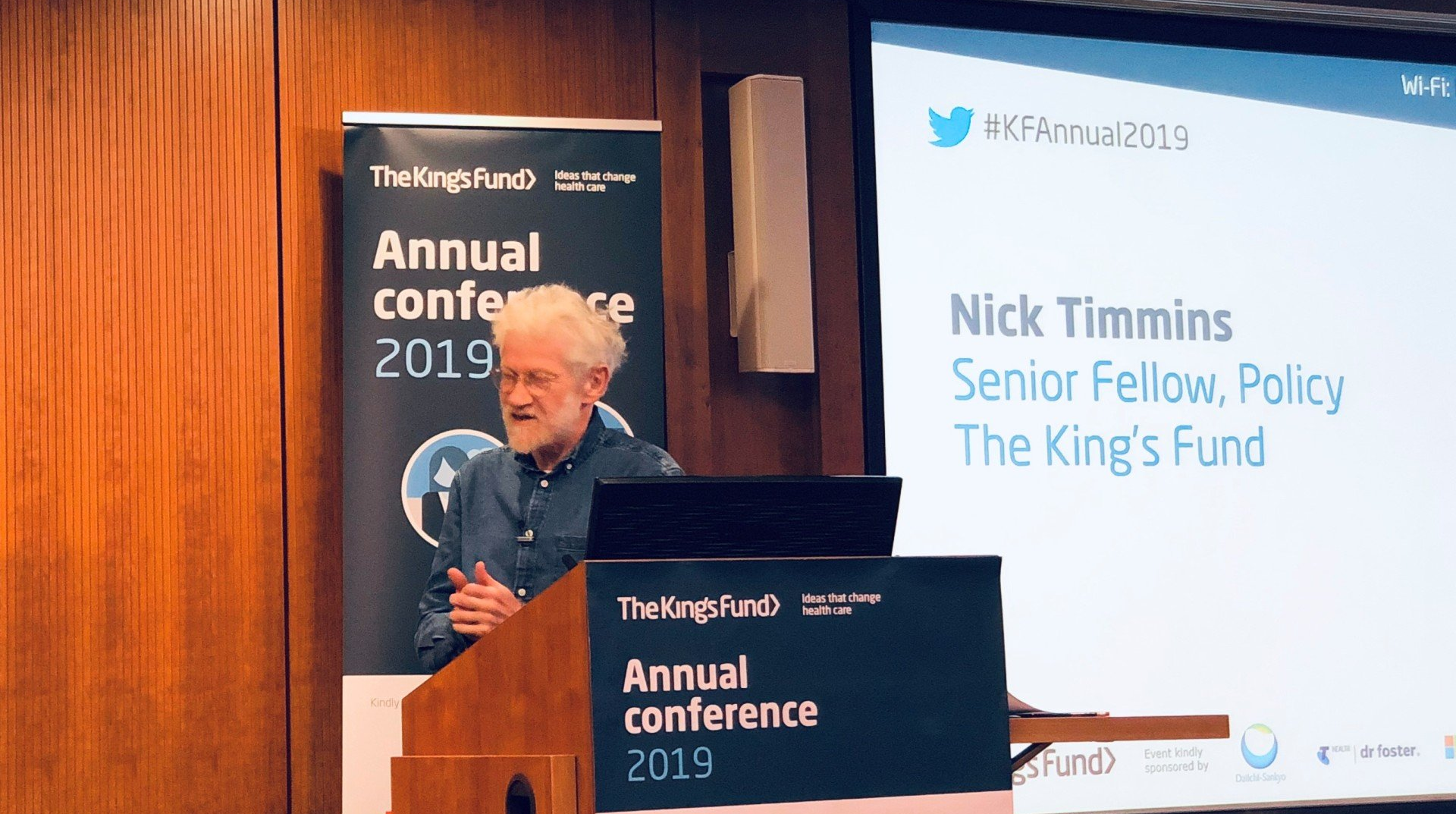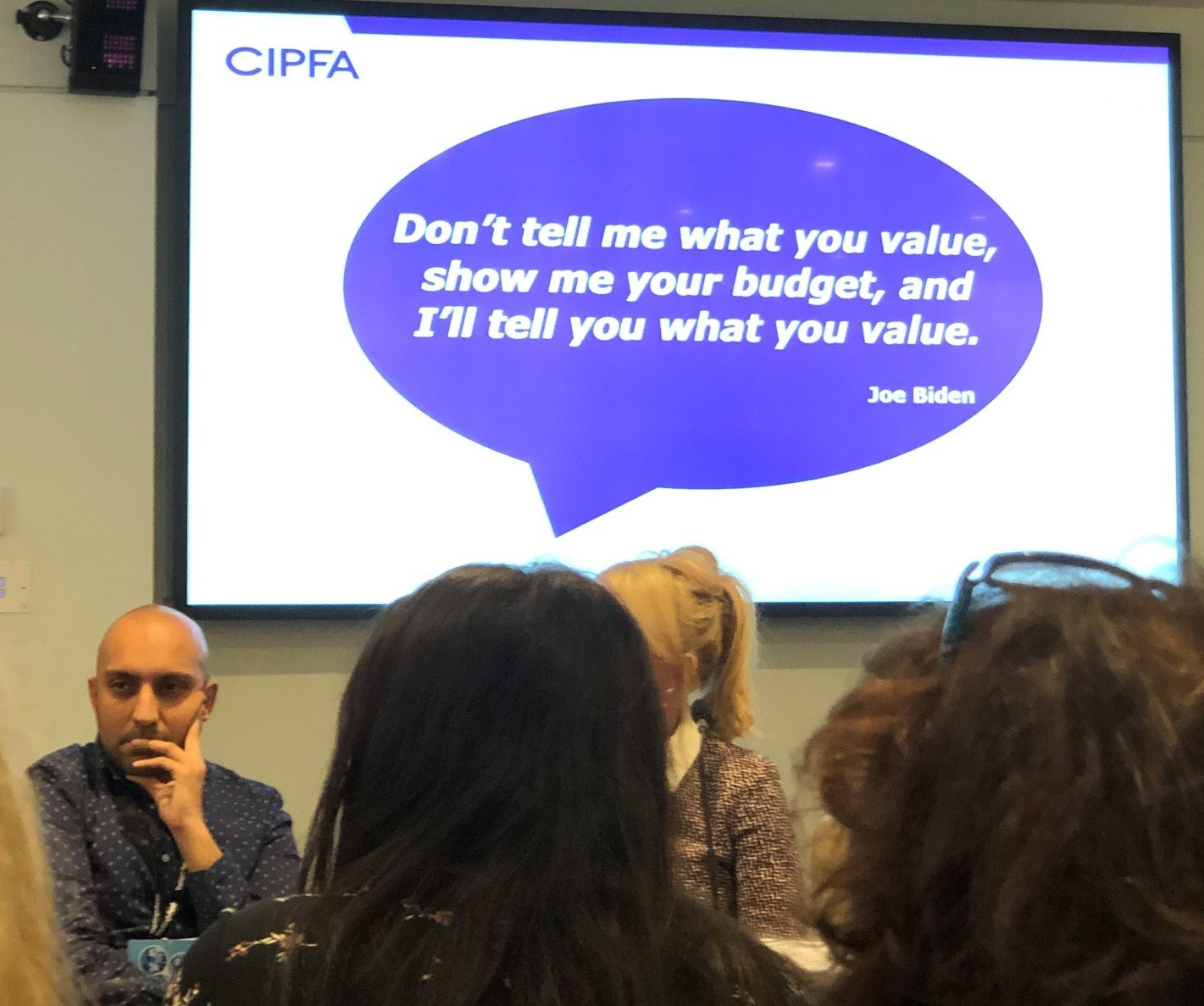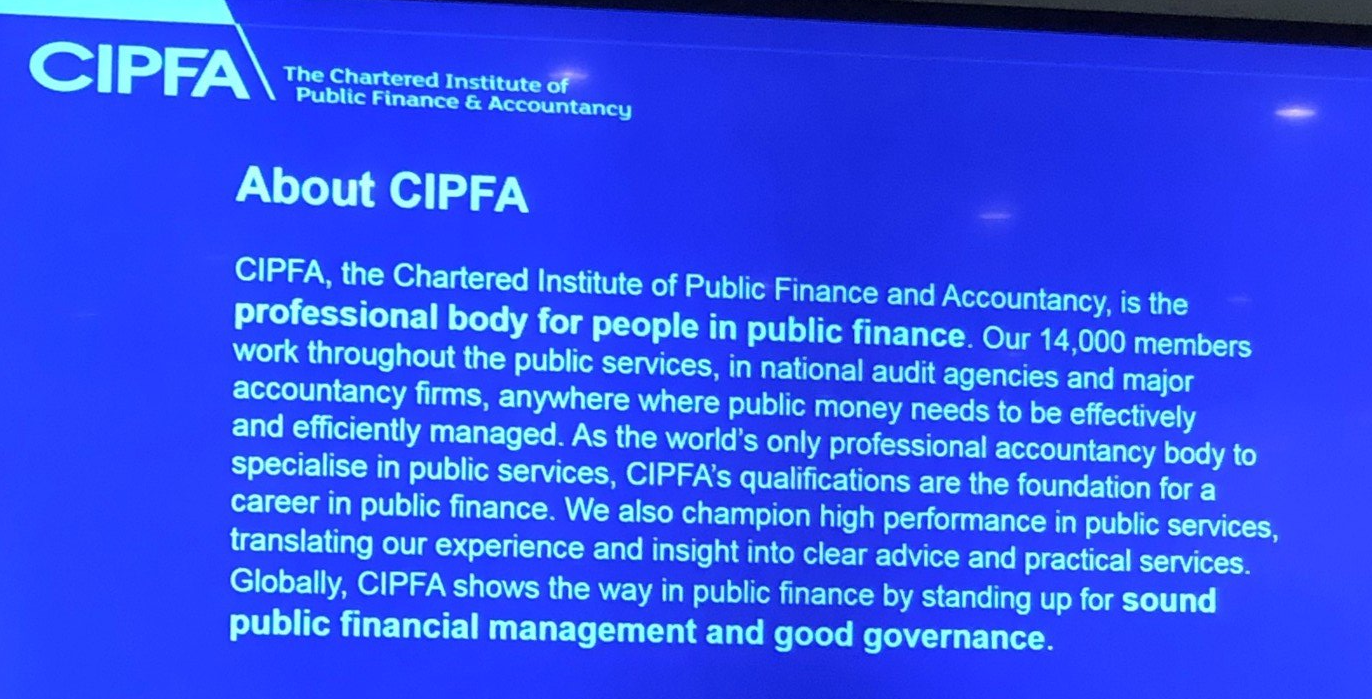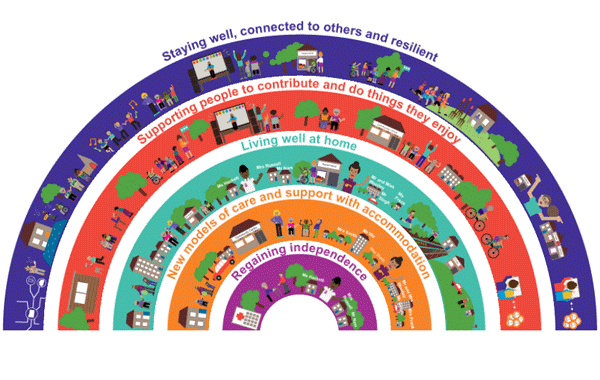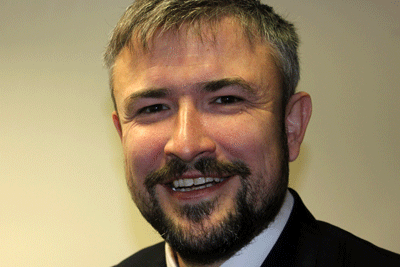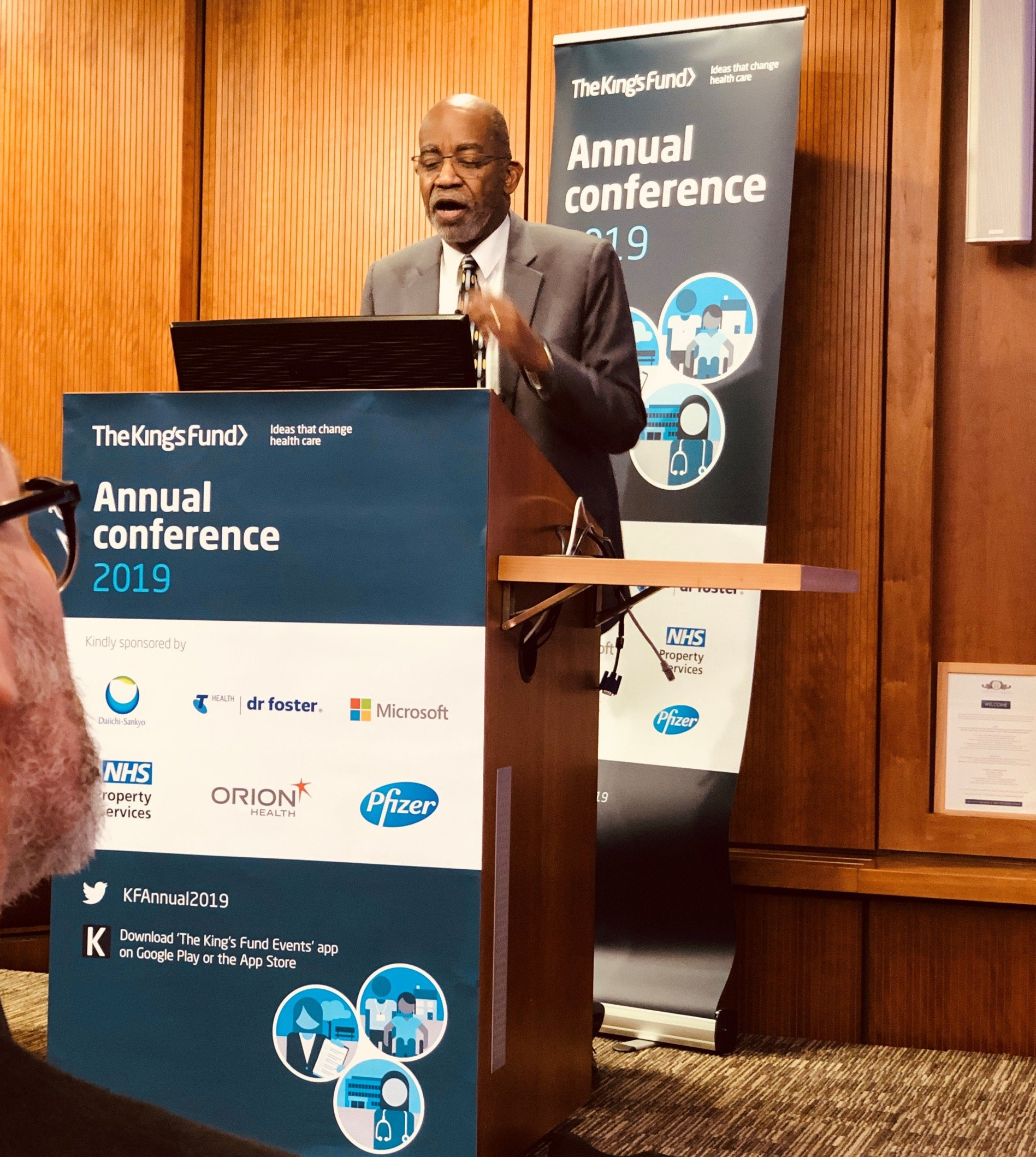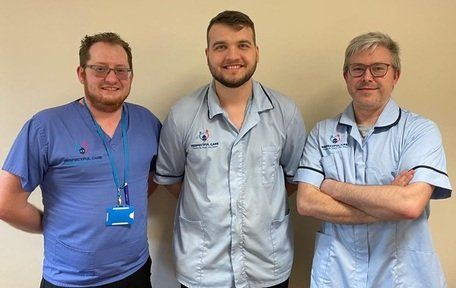The King's Fund Annual Annual Conference 27th November 2019
Sophie Chester-Glyn • Nov 29, 2019
The King’s Fund is a leading think-tank and independent charity which holds regular health and social care event and shares research and commentary. Whilst the King’s Fund has traditionally focused on health-related topics, it is increasingly shining the light on aspects relating to social care. This is a summary of some of the talks from the first day of its two-day annual conference held in London on 27th November 2019.
This was Coproduce Care’s first time attending an annual conference held by The King’s Fund
and the line-up of speakers was impressive. The morning’s breakfast session included Richard Sloggett
(Former Policy Advisor for Matt Hancock), Lesley Regan
(President of the Royal College of Obstetricians), Ben Jupp
(Director of Policy Social Finance) and Natalie Bohm
(Senior Medical Affairs from Pfizer UK). The session’s focus was on delivering population health. Richard pointed out that prevention in government is difficult and siloed and that the system lacks patient centricity. Integrated care systems on the other had will move towards a person-centred approach, as the delivery of population health cannot be delivered solely through an NHS lens.
Improving Health Locally
Nick Timmins from the Kings Fund
kicked off the next session introducing his new report on ‘Leading for integrated care’ which has the apt subtitle of:
‘if you think competition is hard you should try collaboration’
What does it all mean?!
The panel for this first session went on to explain their tips for leading across complex health and care systems. However, a member of the audience asked a prevalent question: ‘what’s an SHA?’ she asked, ‘can you all please stop using acronyms and I don’t know what you mean’. Unfortunately for her, however the conference was full of acronyms which no one really stopped to explain.
The importance of language in effecting behaviours was pointed out by Owen Williams
(Chief Executive of Calderdale and Huddersfield NHS Foundation Trust) who mentioned that within his organisation he decided not to use the work Integrated Care System
(ICS) but instead used ‘partnerships’ as that was effectively what they were creating. He explained that organisations should refrain from waiting for central government policy or action and start affecting better collaboration as well as change locally to benefit their populations. Concerns about ‘BME representation’ were also high on Owen’s list, arguing that conversations around representation should happen more frequently.
Professor Paul Burstow
(Independent Chair at Herefordshire and West Essex Sustainable Transformation Partnership) pointed out that, when working within integrated systems, people should consider whether they are going to ‘change the rules or play by the rules’
and that the challenge is often that people embarking on integrated systems often want to know the end result so that they can work towards it. However, this is often very difficult to certify when the change is developed corproductively.
According to Paul, what would be helpful is a better conversation between local government and NHS on funding.
Paul Burstow had some final quick-fire tips:
- On Talent: if health and care organisations are thinking of how you are working as an integrated system, the talent within your organisation should be the bridge builders to move things forward.
- On Priorities: don’t have too many!
- On Governance: within his organisation they are constructing a new governance in working in NHS or as a multi-sector partnership rather than within an NHS construct. The concept of ‘looking up’ is key.
- On Challenges: expecting people to effect integration within the day job, is a tough ask and is very difficult – a theme which came up a lot during the day.
- On Recruitment: – Paul’s team is looking for a new leader! …….. #Spreadtheword.
Breakout sessions – the role of social care in prevention
This session didn’t specifically focus on traditional forms of social care but was more focused on community support. The session was chaired by The King’s Fund’s Simon Bottery
and included representations from Social Care Institute for Excellence
(SCIE) and The Chartered Institute for Public Finance and Accountancy
(CIPFA).
From a finance perspective, Dr Eleanor Roy
(from CIPFA) pointed out that over half of most local authorise budgets are spent on social care and that the barriers to prevention were a lack of long term commitment which lasts longer than a term in government. In comparison to health, social care faces a higher bar for preventative outcomes and that there is often a push for cash incentives.
Find out more here: https://www.wyhpartnership.co.uk/application/files/3215/5428/0490/Loneliness_case_study.pdf
Ewan King
(Chief Operating Officer for SCIE) discussed SCIE’s work with Think Local Act Personal and mapping the fantastic innovation carried out by community groups as represented on their community-centred support directory resource (see below and access online here). The aim is to create a resource whereby Commissioners can find out about new and innovative approaches to care and support for adults and providers and people with lived experience can see what’s going on locally and nationally.
Ewan explained how organisations such as the Red Cross, Key Ring
and Cares family
have already interacted with the directory and are sharing great practice by tackling isolation, making savings helping people to achieve their goals.
What we felt was a lesser known but very interesting part of Ewan’s talk was SCIE’s Social Care Innovation Network. Ewan explained that this aims to find out what works and what people need to do when ensuring integration happens. Well worth a look.
We asked the question at the end of the session of:
“what is the definition of social care?”
Apparently, this is too big a question and needs a whole session to answer it! Give us your comments…..maybe this should be a topic for a ‘Coproduce Care Chat’ for YouTube??
Manifesto – Which Party for Health and Social Care?
If you find this brief summary on election manifestos lacklustre - Never fear, the Kings fund is doing two great things over the coming days:
- Releasing a podcast to discuss the manifestos
- Releasing a manifesto grid to help voters navigate the health and social care manifesto quagmire (yippee!).
Inequalities in health and care
The last session, before a well-deserved drinks reception, included a mind-blowing talk from Professor David R Williams
(Professor of Public Health and Chair Department of Social and Behavioural Sciences, Harvard University). We’ve heard from Professor Williams before at the NHS Confed
and much of his talk similarly centred around detailing emotive facts and effects of inequality.
Professor Williams reminded us of:
- the experiences of discrimination are a source of toxic stressed suffered by marginalised groups in health and social care workforce
- people dying young because of societal inequalities and access to services
- the resultant high numbers of infant mortality and postnatal depression
- the effects of institutional racism.
Another organisation used electronic inhalers to monitor when and where people used their medication to identify geographical hotspots and crowdsourced innovations so that trucks were re-routed, trees planted and areas targeted for high pollution.
For more on Professor Williams: https://www.hsph.harvard.edu/david-williams/
Another great conferences, packed with information. Hope our brief summary has given you a flavour!
#staytuned #share #CoproduceCare #blogs #democratise the #caredebate
Join us
We will be relying on a small but dedicated team and volunteers.
So, if you would like to be involved, please get in touch at hi@coproducecare.com
and help us open up the care debate, properly democratise care and please do join and share Coproduce Care:
Spread the word and uncover the hidden opportunities for people-led coproduced care
Recent Posts
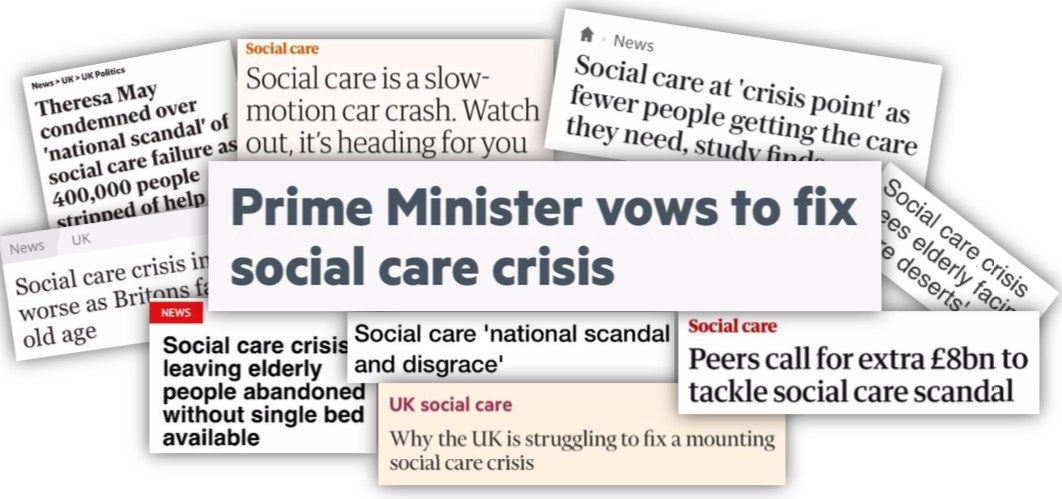
24 Aug, 2023
We are pleased to provide an update our involvement in new projects currently being undertaken by Coproduce Care (CIC) in collaboration with Care and Support West. We will be contributing to local initiatives in Social Care Workforce Redesign, and we are excited to share the project with you. This project is running from June 2023 to June 2024. We will be working on three areas for the next 10 months all in the BNSSG region which are as follows: 1: Investigation of the Trusted Assessor Approach in Health and Social Care Systems In this project, we are investigating the Trusted Assessor Approach in health and social care systems. The objective is to demonstrate the value of Trusted Assessors in streamlining care needs assessment, while also addressing data protection and consent concerns. Case studies will be created from local regions that have implemented this approach, to provide insights into the benefits of Trusted Assessors of reducing delays in accessing required care. 2: BNSSG Opportunities for Levy Sharing and Increasing Apprenticeships in Social Care This project aims to identify opportunities for levy sharing in social care and increase the use of apprenticeships. The project will engage social care providers, training organizations, authorities, and other stakeholders to develop strategies, guidelines, and an implementation plan for utilizing the levy effectively and increasing the use of apprenticeships. 3: Integrated Health and Social Care: Enhancing Collaboration, Improving Quality, Shaping Models of Care, and the Future Social Care Workforce In this project, we are evidencing the enhanced collaboration between social care providers, health services, and local authorities. By mapping existing interfaces and collaborations, we seek to identify opportunities for cross-system benefits and improved outcomes, creating recommendations for integration for BNSSG. Our research will provide valuable insights to integration and collaboration between social care and health. At Coproduce Care (CIC), we believe that collaboration and innovation are vital for transforming social care. Through these projects, we aim to contribute to a more efficient and compassionate system. We extend our gratitude to all stakeholders, providers, commissioners, and policymakers for their invaluable support. Thank you for your continued interest in our endeavours. We will keep you updated as the projects progresses! In the meantime, if you are doing any work in any of these key areas, please get in touch with us using the below form. Thank you!

18 Oct, 2022
Dear Thérèse Coffey, We wish you the best of luck on your appointment as Secretary of State for Health and Social Care. Coproduce Care (CIC) is a non-profit organisation set up to democratise the social care debate. We support the voices of those working and involved in social care to influence wider decision making in the sector. Through our continued work in this area, we are writing to address some of the urgent needs of our social care workforce. We welcome your plans to set out ‘ Our plans for patients ’ to ensure our population have easier access to NHS and social care services through winter, putting the needs of patients as priority. To ensure we prioritise the health and wellbeing of our populations, and deliver the best, high-quality care possible, we need to ensure we prioritise the needs of our workforce who are at the front of delivering health and social care . To ensure both the health and wellbeing of our population and our social care workforce, we recommend the following: 1. Improving pay for social care workers, in real terms The Kings Fund published a report which compared the pay of social care workers to ten of the largest supermarkets. It found that nine out of ten supermarkets paid more than most social care roles. An example used is that if care worker left their role for a supermarket position at Tesco, they would see a 6.3% pay increase instantly. We have conducted many surveys, webinars, and connected with our audience on what is crucial to improving care workers working conditions and we have found that increasing pay is consistently the most crucial factor in reflecting the value of the work and high stress and responsibilities of the role . With the current cost of living crisis, this need for increasing pay is only getting more urgent. The sector currently has 100,000 vacancies , with extremely high levels of staff shortages. This affects the capacity to deliver services and the quality of care provided . Providers are struggling to recruit staff as they are competing with supermarkets and hospitality, sectors of which offer less stress and responsibility and more pay. We believe care workers are an invaluable part of our society and therefore should be paid accordingly. We recommend: · Introduce national pay scales that ensure care workers meet a real national living wage as a minimum . This will recognise the full contribution of social care workers make to the health of our population, and that their contribution is a real investment into our population. By increasing pay, we further increase recruitment and retention in the sector, and improve the perception of social care being a highly valuable and promising career choice. · Facilitate efforts to develop appropriate distribution of funds. Ensuring the integration and professionalisation of care is fully realised will allow better distribution of funds resulting in higher wages which better reflects the level of skill, qualifications, responsibilities and selflessness required to work within this sector. 2. Professionalising the care system Health and social care should be professionalised to encourage staff retention, career progression and further skill development. Professionalising care work would ensure that those working in the sector are valued and are provided with the necessary tools to provide high quality care. Currently, there is no accredited qualification for social care workers, without a standardised training process. We hosted a live stream with Gillian Keegan , who mentioned the government’s intention to create a voluntary digital care workforce hub, as well as a skill passport for all Health & Social Care workers. This is understood to allow easier identification of the workforce, including the possibility to share resources and opportunities to encourage the workforce to up-skill and develop. The skills passport would help keep track of the skills care workers have demonstrated over time, meaning career progression would be easier to identify . Whilst individual action is very important, to improve the quality of care, we urge for a standardised career and training development program for all care staff that results in an accredited qualification . We recommend: · Adequate pay to restore and recognise social care work as a valued profession . Extensive skills are involved in care work, and if standardised training and qualifications are implemented, security of applicable income is appropriate to these expectations. By increasing pay, care work has higher professional footing as a recognised career and role. · Ensuring the integration of social care is fully realised . The high fragmentation of the care sector and its lack of integration with NHS services makes it challenging to implement standardised training . The governments white paper ‘ Health and social care integration: joining up care for people, places and population ’ seeks the ambition to join up social care services. We welcome this white paper and its integration policy to achieve higher quality of care and better health outcomes. This ambition requires effort and commitment to the integration at all levels, and we hope that as health secretary, fully putting this policy into practice and reaching its scope, goals, and purpose is your focus in your new role. · Implementing standardised training, improved learning outcomes for workers, including IT, literacy, and numeracy training are addressed with sensitivity and with the voices of the workers at heart . Implementing standardised training would ensure a level of professionalism across the sector, however, must go in line with the security of increased income and security of hours of work. We must protect the wellbeing of our workforce, of which is already experiencing burn-out and exhaustion from the high pressures the sector is facing. We cannot have higher expectations of our workers undertaking standardised training without adequate pay . We hope you agree with our recommendations and seek to ensure we continue to improve the working conditions for our social care workforce. We hope that within your post as the new Health and Social Care Secretary, you prioritise the voices of those most impacted by decision making regarding the sector. Thank you for taking the time to read this letter, CoProduce Care Written by: Gabriella Neal
Privacy | Sitemap | Contact us | Login
© 2024
CoProduce Care Ltd. All rights reserved.


